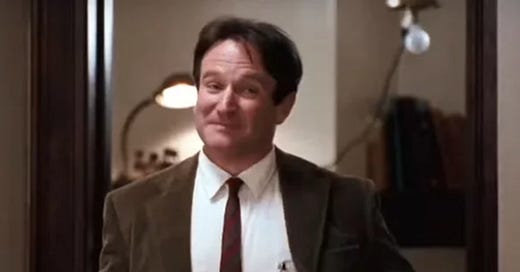What We Stay Alive For
Robin Williams, Ethan Hawke, a sweaty-toothed madman, and how we heal each other.
When I started my post from a few days ago about The Extremely Unreliable Critic, I’d originally intended for it to end differently than it did, with a different point to be made. But the muse took hold and the words went the direction that they went and instead I found myself writing about the universal psycho-cosmic thunderdome all of us enter as people trying to engage in any sort of creative act. I like where it ended up.
But I want to revisit Ethan Hawke’s beautiful talk about giving yourself permission to be creative that began that whole thing.
And before I get into Hawke’s talk, first I want to talk about something else it brings to mind, a movie Hawke starred in more than 30 years ago: 1989’s Oscar-winning The Dead Poets Society, starring Robin Williams as teacher John Keating some 25 years before Williams died from suicide. I mention that because it adds some weight to what we’re talking about here, and because it drives home the point Hawke is going to make for us by the end…
Keep reading with a 7-day free trial
Subscribe to Brandon Sneed to keep reading this post and get 7 days of free access to the full post archives.

